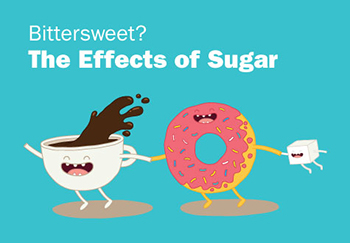
I’ve got a bit of a sweet tooth. I like my coffee light and sweet. I’m a fan of a good slice of cake. I raid my kid’s Halloween chocolate stash. In fact, as I’m writing this very line, I’m reaching for a cookie. Sometimes, I just crave the sweet stuff.
Unlike me, my wife is more of a salty snack person. She’ll take chips over cake any day. She’ll skip the ice cream for more hummus. She rarely has cravings for sweet food.
But she’s probably eating more sugar than she thinks, because sugar is actually one of the most common ingredients in processed foods. According to the Centers for Disease Control and Prevention (CDC), most Americans get about 13% of their daily calories from sugar added to processed food. Whereas, the World Health Organization recommends that only 5% of daily calories should be from added sugar.
Pour Some Sugar on Me
Our bodies need energy from food so we can live. We get that energy from glucose, a simple form of sugar. (There are other forms, like sucrose, which is regular granulated sugar.) So it’s no surprise that sugar is one of our most celebrated food ingredients, inspiring sculptures, songs and even TV competitions.
Unfortunately, we know eating too much sugar can lead to all sorts of problems, including dental issues. “We are seeing more and more negative consequences of excessive sugar intake. The list is endless,” states Katherine Basbaum, MS, RD, a clinical dietitian with UVA Health. “We have research that shows pretty conclusively that added sugars have a detrimental effect,” she adds.
Tooth decay, unwanted weight gain, heart disease, acne and diabetes have all been linked to eating too much sugar. Despite knowing this, most of us struggle to resist that donut calling to us from the cupboard.
Seems like we’ve got a pretty good idea of what happens to our bodies when we overindulge in sweets. But what about our brains? What are the effects of sugar on the brain?
Sugar Rush: The Effects of Sugar on the Brain
When you eat something, it triggers a number of actions inside of you. Your tongue sends signals to your brain about what you’re tasting. Your gut and your brain work together, in turn, to release dopamine into your blood. Dopamine makes you feel good, which reinforces that what you just did (eat something) is good.
When it comes to sugar, your brain has an especially strong dopamine response. So, we keep wanting it and wanting more of it. That can lead to cravings, a higher tolerance for sugar and eating more to get that same dopamine effect.
The Addiction Connection
Hmm… cravings, higher tolerance, a desire for more and more to get a good feeling? The effects of sugar on the brain sound a lot like addiction.
“The same brain structures and the same reward,” Basbaum says. “The feeling of reward is the same for sugar as it is for those addicted to drugs and alcohol. You don’t want to get addicted to something that causes inflammation, weight gain and chronic disease.”
A recent study, building on work done with animal experiments as well as public health research on obesity and food addiction, said that there is “strong evidence of the existence of sugar addiction (PDF).” It found that sugar “addiction” shared five of the eleven criteria for substance abuse disorder seen in the Diagnostic and Statistical Manual of Mental Disorders (DSM-5):
- Use of larger amounts and for longer than intended
- Cravings
- Hazardous use
- Increasing tolerance
- Withdrawal
Sugar’s Long-Term Damage
Inflammation (redness and swelling of our body tissue) is another concern, Basbaum says. Inflammation is part of our natural healing process. However, some foods, like sugar, can also trigger inflammation in our bodies. Eating too much of these foods can lead to a state of constant low-level inflammation.
“If inflammation is the root of so many health issues, like arthritis, autoimmune diseases (like rheumatoid arthritis), heart disease and diabetes, then sugar, which we know is inflammatory, is only going to make things worse,” says Basbaum.
Sugar can also affect your mood. Eating sugary foods can cause sudden spikes and drops in blood sugar levels. These make you feel irritable, anxious or even depressed. “When I see people with major depressive disorder, I check to see if their diets are high in sugar,” says Basbaum.
That inflammation can also have lasting effects on your brain. A 2013 study linked high blood glucose levels to neurodegenerative conditions like dementia and Alzheimer’s. “Alzheimer’s, for example, is a neurodegenerative, inflammatory disease. The last thing we want to do is add fuel to that fire with added sugars in the diet,” Basbaum adds.
Sweet Excess
It seems that our favorite sweet treats come with some baggage. But being mindful of your food choices, like reducing how much soda you drink or checking food labels for added sugar, can go a long way to keeping both your body and brain healthy.
Making Healthier Choices
Need help kicking that sugar habit? Contact the registered dietitians at UVA Health’s Nutrition Counseling Center for help.
Basbaum reminds us: “There’s no one-size-fits-all fix or strategy when it comes to fixing your diet. But your brain can readapt after reducing your sugar intake, to the point where you’re not going to crave sugar as intensely as before. You may pick up a donut down the road a few weeks from now and take a bite of it and it’s going to taste almost sickly sweet. You wouldn’t believe that tasted normal to you just a month before.”
So next time you’re thinking about reaching for that candy bar, maybe consider your future brain health over that immediate sugar reward.


Once I went a month without eating sugar in the form of cookies, cakes, etc. I still ate fruit but only 2 a day. After that I didn’t crave it at all. Then I ate ate a croissant and could really taste the sugar wheras I couldn’t before. The trick is to get past a month of no sugar to stop the cravings.
I am 42, I take sugar with tea and sometime with sweet dishes, however, when I was kid, I used to eat sugar to much (mean sugar itself) and I did it almost 6 seven years.
Do you think that 6 to seven years eating sugar may have some long lasting side effects.